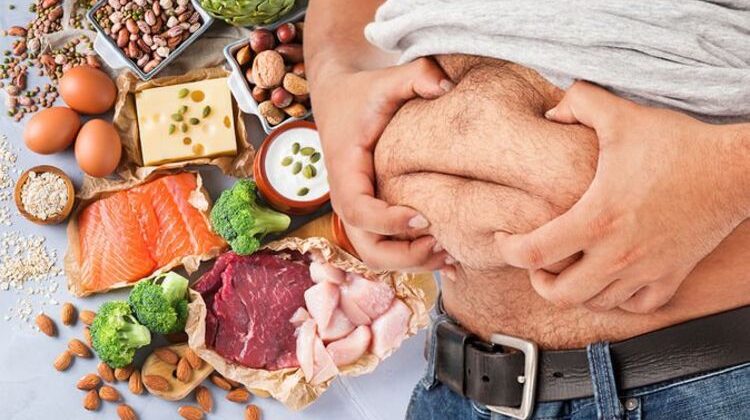Dr Zoe Williams discusses visceral fat on This Morning
We use your sign-up to provide content in ways you’ve consented to and to improve our understanding of you. This may include adverts from us and 3rd parties based on our understanding. You can unsubscribe at any time. More info
Fortunately, there are a number of ways to reduce visceral fat.
One of the most common ways, alongside exercise, is through an individual’s diet.
According to the health provider Bupa, “protein can be a helpful way to lose weight because it makes you feel fuller than carbs and fat”.
“[I]f you include a lean source of protein in your meals you may find that you’re not as hungry, and so eat less.”
Good sources of protein include chicken, tuna, mackerel, salmon, eggs, and milk.

However, if an individual is unable to consume these foods due to a plant-based diet or other medicinal reason, there are alternatives.
Plant-based sources of protein such as red lentils, chickpeas, brown bread, nuts, and soya, are all strong plant-based sources of protein.
Alternatively, protein is available through supplements, shakes, and bars.
For an idea as to how much protein is needed, it is recommended that a portion is as large as the palm of an individual’s hand.
Furthermore, while eating food high in protein can help reduce visceral fat, it is important to make sure that it is not also high in fat.
Eating a meal high in protein is not the only tip recommended by Bupa.
The health provider also suggests, as the NHS does, regular exercise.
At least 30 minutes is the minimum, with more exercise resulting in more visceral fat burned.

In a bid to help patients lose weight, the NHS recently launched their soup and shake diet in order to help individuals both lose weight and help control their type 2 diabetes.
On average participants in the initial study lost 13kg in three months and around seven kilograms in the first month.
This has now been expanded to 11 regions across the UK.
As well as helping individuals to lose weight in the short term, it was also found to assist them in the long-term.

In response to the results of the diet, NHS Director Professor Jonathan Valabhi said: “The fantastic results our participants have achieved through this programme are really encouraging.”
While the NHS has found a way to help individuals lose weight, it is facing a crisis at the other end of the scale as the number of young people reporting eating disorders is rising.
NHS leaders have said this forms part of a “second pandemic” that will hit the NHS after COVID-19.
For more information on this and other matters contact the NHS and consult with your GP.
Source: Read Full Article
